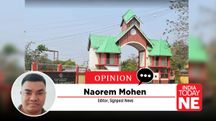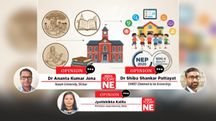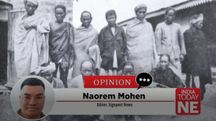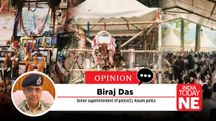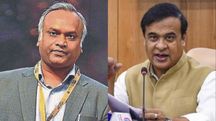
Shaping Assam’s Future: Education, Governance, and the Promise of Bor Assam
It began with a song, and in that simple moment, the aspirations of an entire state seemed to converge. On Saturday, October 25, 2025, in New Delhi, a gathering organised by Axom-New Horizons, an informal forum of Assamese professionals living in Delhi established in 2016, brought together a wide cross-section of the Assamese diaspora.
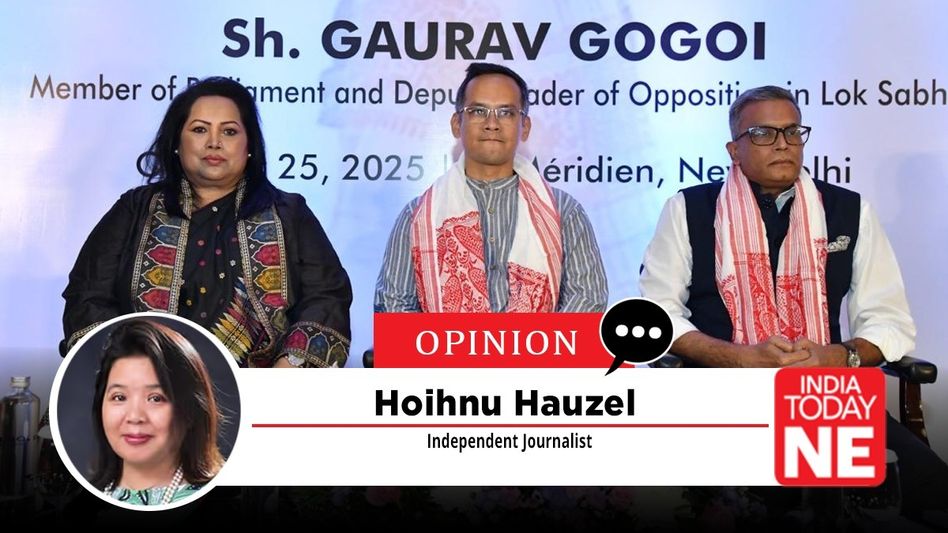
It began with a song, and in that simple moment, the aspirations of an entire state seemed to converge. On Saturday, October 25, 2025, in New Delhi, a gathering organised by Axom-New Horizons, an informal forum of Assamese professionals living in Delhi established in 2016, brought together a wide cross-section of the Assamese diaspora. The event was convened and organised by Krishna Sarma, an employment lawyer and proud Assamese, whose vision and meticulous effort had made the evening possible.
The discussion, titled “Shaping Assam’s Future through Education, Skills, Employment, and Economic Growth,” was anchored by Gaurav Choudhury, an avid interviewer and podcaster, known for conducting insightful and probing conversations that bring depth and nuance to every dialogue. His moderation made the session truly engaging, allowing for candid exchanges and reflective discourse. The event featured Gaurav Gogoi, Member of Parliament from Jorhat, Deputy Leader of Opposition in Lok Sabha, and President of the Assam Pradesh Congress Committee. The audience, comprising professionals, educators, students, and cultural enthusiasts, mirrored the inclusivity, multiculturalism, and engagement that Gogoi described as “Bor Assam.”

Before the dialogue formally began, the room shared a rare, deeply emotional experience: Zubeen Da’s soul-stirring “Mayabini,” followed by the national anthem “O Mur Apunar Dekh.” Beneath the music and ceremony lay a quiet urgency, Assam is set to go to the polls in the next six-seven months, and every question, insight, and conversation carried the weight of that approaching democratic moment.
Assam is not merely a state; it is the corridor and gateway to the entire Northeast, the elder brother of the region, historically and strategically positioned as a hub of culture, commerce, and power. Its role extends beyond its borders: what happens in Assam resonates across the Northeast, shaping trade, policy, and opportunity. Yet, despite this significance, challenges of connectivity, infrastructure, and investment continue to constrain its potential, raising questions about how the state can truly harness its historic and geographic centrality for the benefit of all its people.
Assam at a Crossroads: Recognising Structural and Intellectual Gaps
Gaurav Gogoi began the discussion by invoking a vision of Bor Assam, emphasizing an inclusive, forward-looking state where opportunities, governance, and resources are equitably distributed. Yet, he did not shy away from confronting the structural realities that impede Assam’s progress. Chief among these was the state’s education system, where, despite a proliferation of universities and colleges, students often emerge without critical thinking skills or the ability to conduct original research. As Professor Jyotimoy Talukdar of Ashoka University highlighted from his experience teaching writing and English language courses over eight years, students in Assam are rarely encouraged to question assumptions or generate knowledge independently. Education in humanities and social sciences, in particular, remains largely rote-based: memorisation of facts dominates, and opportunities for inquiry, experimentation, and intellectual courage are minimal.
Professor Talukdar’s concerns extended beyond pedagogy to institutional structure. While the government has upgraded many colleges into universities, the faculty, curricula, and intellectual guidance often remain unchanged. Students may now hold degrees with grander titles, but the transformation is largely superficial if intellectual infrastructure and faculty mentorship are not simultaneously strengthened. Leadership, he argued, is crucial: the head of an institution should be chosen for merit and vision, rather than political considerations. Only then can students transition from passive recipients of knowledge to active, critical thinkers capable of original research, particularly in humanities and social sciences.
Gogoi responded with agreement, highlighting that education reform in Assam requires more than physical infrastructure. Improving facilities alone cannot foster an intellectually vibrant ecosystem. The state must invest in faculty training, cultivate leadership in institutions, and embed critical thinking as a central objective of learning, moving beyond the outdated focus on syllabus completion.

Regional Disparities and the Need for Equitable Growth
The discussion also addressed Assam’s persistent regional imbalances. While Guwahati has become the epicentre of educational and professional opportunity, interior districts such as Karbi Anglong, Kokrajhar, and the Barak Valley lag. Educational institutions in these regions face shortages of resources, faculty, and mentorship opportunities, forcing many students to migrate (or even drop out) simply to access basic education. For Assam to realize its potential, development must reach beyond urban hubs, embracing the rural and interior districts that house most of the state’s population.
Beyond education, humanitarian concerns were raised regarding internally displaced persons from Manipur, who have sought refuge in Assam. These communities face uncertainty and precarious legal and economic conditions. Gogoi stressed that inclusive governance must prioritise both equitable development and humane, rights-based approaches to displaced populations, reflecting Assam’s multicultural and compassionate ethos.
Diaspora Engagement and Intellectual Renewal
A notable strength of the evening was the presence of the Assamese diaspora—professionals living in Delhi and who are deeply invested in the state’s future. Gogoi emphasised that this community represents an untapped reservoir of expertise, mentorship, and strategic thinking. Structured engagement with the diaspora could provide guidance to students, support start-ups, and offer advisory inputs to governance, creating bridges between Assam and the wider Indian and global intellectual landscape.
The discussion brought forth a broader principle: Assam’s progress is inseparable from the development of its intellectual ecosystem. A state cannot thrive on infrastructure or policy alone; it requires a culture of questioning, debate, and original thought, cultivated both in institutions and through community engagement.
Bor Assam: Vision, Culture, and Collective Aspiration
Throughout the evening, the leitmotif of “Bor Assam” resonated in every conversation. This vision is not limited to governance or economics; it encompasses education, inclusivity, regional balance, and cultural vitality. It demands a transformation of Assam’s educational institutions to promote critical thinking and research, equitable distribution of resources to uplift all regions, and policies that honour human dignity. Equally important is the active participation of the diaspora and local communities, who collectively shape the intellectual and cultural fabric of the state.
The emotional undercurrent of the event highlighted by the shared experience of music and national pride reminded participants that Assam’s challenges are not merely political or administrative; they are social, cultural, and emotional as well. There is pride, but also grief over what has been lost or neglected, and hope for a future shaped by thoughtful, engaged citizens.
What Ails Assam?
The question itself posed by someone from the audience “What ails Assam?” is deceptively simple, yet it touches the core of the state’s structural and systemic challenges. Gogoi’s response was reflective and incisive. Assam, he noted, produces one of the world’s most celebrated commodities—tea—yet the economic benefits largely bypass the state. Profits are captured elsewhere, leaving Assam rich in heritage but relatively poor in economic empowerment.
The root of this disconnect, Gogoi argued, lies in geography and infrastructure. Assam’s distance from India’s economic epicentres like Mumbai or Bengaluru constraints trade, investment, and opportunity, creating a structural bottleneck. Even in an era of digital work and globalisation, these constraints persist. He cited Shillong, a neighbouring state, as an illustrative example: professionals elsewhere leverage high-bandwidth connectivity to work remotely from lifestyle hubs like Goa, yet regions like Shillongor Assam itselfremain marginalised due to insufficient digital and physical infrastructure.
Assam’s isolation, he emphasised, is not merely spatial but institutional. Poor connectivity—whether in transport, technology, or governance—limits the state’s ability to translate its human, natural, and cultural capital into tangible growth. Geography, in essence, becomes more than a backdrop; it shapes possibilities, curtails potential, and defines the terms of Assam’s engagement with the broader Indian and global economy. The question of “what ails Assam” thus goes beyond policy—it is a meditation on how structural inequities, if unaddressed, stifle ambition and perpetuate untapped potential.

Healing, Thinking, and Acting Together
The dialogue at Axom-New Horizons reflected both the depth of Assam’s challenges and the richness of its potential, should it navigate its course wisely. Education must evolve from rote memorization to a culture of critical inquiry. Regional disparities must be addressed through resource allocation and mentorship initiatives. Governance must balance inclusivity, human dignity, and merit-based leadership. And Assam’s diaspora must be recognised as a vital partner in the state’s intellectual and professional revival.
Gaurav Gogoi’s vision of “Bor Assam” an inclusive, culturally rich, and forward-looking state—is ambitious, but it is grounded in practical steps: improving leadership in education, fostering intellectual ecosystems, engaging the diaspora, and promoting regional equity. The evening made clear that Assamese identity is not a static inheritance but a living project, one that requires commitment, imagination, and courage from all its stakeholders.
Copyright©2025 Living Media India Limited. For reprint rights: Syndications Today
